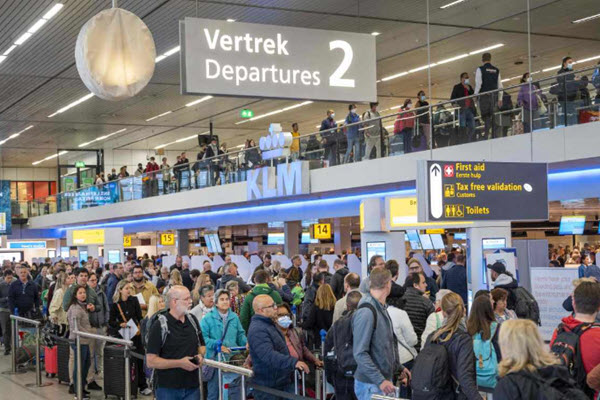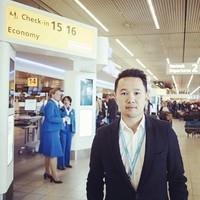Amsterdam Schiphol Airport PRM Manager Calls on EU to Act on Abuse
 Passengers queuing at Schipol Airport, July 2022
Passengers queuing at Schipol Airport, July 2022
Share on social media
In this exclusive interview, Amsterdam Schiphol airport PRM (Passengers with Reduced Mobility) Manager Wen Cheung explains the challenges the airport assistance service is facing as travel and tourism recovers. By Roberto Castiglioni, Reduced Mobility Rights.
Airports all over the world are dealing with unprecedented growth in passenger numbers, as well as an increase in requests for assistance from disabled passengers. With this unprecedented growth, airports are struggling to keep up and ensure that every passenger meets their needs.
“From my (professional) network such as Brussel, Heathrow, Manchester, Dublin, Paris, Vienna, Oslo, Germany stations, and many more I hear the same problems, which appeared immediately after the reopening of aviation and removing covid travel restrictions,” Wen says. “(To make things worse) this comes in combination with the European shortage of workforce across the whole aviation sector. I was told by aviation studies that we would get the PRM numbers pre-covid by 2025 or 2026. Clearly, this forecast proved to be inaccurate.”
A recently conducted study by OZION Airport Software, a company specializing in IT solutions designed to help PRM managers of international airports, shows that requests for assistance at airports across Europe continue to outpace the growth in passenger numbers.
 Photo of Wen Cheung in Amsterdam Schipol airport.
Photo of Wen Cheung in Amsterdam Schipol airport.
“Long queues at security (checkpoints), understaffing, (extended) cleaning processes, fewer airbridge operators and luggage handlers at the Schiphol airport queue are some of the reasons leading to an enormous waste of waiting time for our PRM (assistance) agents.”
Queues are a common feature at airports and it's not uncommon to see long ones right at the most important points in your journey: check-in, security, the lounge, and the gate. It is evident that staffing shortages are on the rise, which may lead to longer queues.
Long queues are the root cause of an exponential increase in requests for assistance. “Passengers who previously never requested assistance now calculate their way to the airport and request ad-hoc (non-pre-booked) assistance en masse,” Wen says. “I spoke to several PRM managers, we have the same challenge, an incredible increase in PRMs. Due to the long queues, our assistance requests are significantly higher (+ 30% more requests compared to 2019) due to the fact that they can get through the security queues faster. There is a lot of abuse of our service.”
These selfish passengers really don't think about the consequences of their actions, which is a slap in the face for people like Rivka Smit who needs to be assisted due to her muscle disease SMA. "People have no idea what sacrifices we have to make to be able to travel," she tells NH Nieuws. "We have to arrive earlier to ensure that our wheelchairs and aids can be transported safely. We understand that, of course, but it only gets more difficult if people start creating these kinds of situations."
According to a spokesperson for the airport, requests for help have been increasing at Schiphol and this is due to two different reasons. "Partly it is because people have to wait longer and therefore need physical assistance earlier. On the other hand, we also see that travelers use aids to avoid queues."
The spokesperson said it would be difficult for Schiphol to change this. "We are legally obliged to provide assistance to anyone who asks for it, so we are not allowed to ask for the reason for the request. Hence the call to people to only request assistance if you really need it."
However, the Interpretative Guidelines from 2012 have given airports some leeway to curb abuse. The document states that “Only where an assistance provider identifies an obvious situation of abuse should a more specific in-depth inquiry be undertaken. Such an investigation should be handled with the utmost care, taking into consideration the dignity and right to privacy of the passenger concerned.”
“Uniformity is needed as soon as possible from European Commission, not tomorrow but right now. We need an EU PRM contingency plan,” says Wen Cheung. “Of course, I want to respect the letter of the law, but it doesn't work now. There is a lot of abuse of our (assistance) service. EC1107/2006 (the European anti-discrimination framework) is not intended to be massively abused.”
Waiting to hear what the officials in Brussels will say, Schiphol and other airports across the continent are continuing to do their best to provide quality help.
“I dispatch my resources in accordance to passengers' needs such as WCHS, WCHC, DPNA, and all those PRM passengers who pre-booked assistance,” Wen adds. “We are finally reminding the airlines that they have to notify 36 hours in advance to get the (best) service.”
In order to serve those who need more assistance, Schiphol is allowing non-pre-booked passengers to access a different level of service. “Right now we offer an alternative for those passengers who have not pre-notified and they will be referred to free wheelchairs or wait until I have resources ready with the chance of missing their flight,” Wen says.
 Mobility Rights CEO, Roberto Castiglioni is a Member of ENAT and ENAT Project Researcher on aviation matters.
Mobility Rights CEO, Roberto Castiglioni is a Member of ENAT and ENAT Project Researcher on aviation matters.
